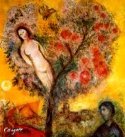|
When Adam was settled in the Garden of Eden (גן עדן), God told him that he was free to eat from any tree in the Garden except from "the Tree of the Knowledge of Good and Evil" (עֵץ הַדַּעַת טוֹב וָרָע), which logically implies that evil existed before that time. After all, the knowledge of something assumes the existence of that thing, and if there was knowledge of evil, then evil would exist, at least potentially... If we understand evil (in this context) as a volitional act of disobedience to God's will, the existence of moral agency that could disobey the divine imperative must be assumed. And since the angels were created before the earth was created (Job 38:4-7), then Satan - understood to be an angelic being - had rebelled against God some time before the original prohibition was given to Adam and Eve. Good and evil are therefore terms defined in relation to the person and nature of God: that which is "good" is what God reveals as good, and that which is evil is the negation (or privation) of that good. God's inherent goodness is non-derived and absolute, however, and therefore there is no standard "above" God that determines his judgment about what is good and what is evil. God is the source of all goodness, whereas the "sitra achra" (סִטְרָא אָחֳרָא), or the "other side" of God's will, is the realm of evil or demonic powers. This is implied in the first verse of Scripture:
 |
Now some time after Adam and Eve were created, then, a mysterious being called "the serpent" (i.e., ha'nachash: הַנָּחָשׁ) appeared in the Garden tempting them to do evil by disobeying God. In the Torah we read: "Now the serpent was more "subtle" or "cunning" (i.e., arum: עָרוּם) than any other beast of the field that the LORD God had made" (Gen. 3:1). Notice that while the serpent was described as "cunning," he had carefully disguised himself as a "beast of the field" (חַיַּת הַשָּׂדֶה). In his ploy to sabotage God's crowning act of creation, he slyly pretended to be a humble animal that was curious about God's appointed king and queen over the earth. "Was it really true," the serpent began, "that God said you shall not eat from any tree of the garden?" Undoubtedly the serpent deliberately misrepresented God's will in order to set his bait. Eve responded to the question by correcting the beast, teaching him that they were allowed to eat fruit from any of the trees in the garden except for the tree in its midst. She then recalled God's commandment, saying: "You must not eat from it, and you must not touch it, or else you will die" (Gen. 3:2-3). In this connection note that Eve had misquoted the commandment by adding the prohibition not to touch the tree, something God did not say (Gen. 2:16-17).
At any rate, the serpent, seizing the opportunity to exploit Eve's overstatement, directly contradicted her understanding of the matter: "No, you shall not surely die!" He then insinuated that God's ulterior motive was to restrict access to the Tree because it would cause their eyes to be opened so they would become like God, knowing the difference between good and evil. It is telling that the serpent accused the Creator with being envious, since that is how he rationalized his own decision to turn away from God, assuming that God did not want to share his glory with any other being than himself (Isa. 14:14).
The trap having been set, Eve became ensnared by doubt. First she began looking the tree over and saw that it bore pleasant fruit; then she recalled the serpent's praise of the fruit of the tree as the means of gaining god-like insight about good and evil, and finally, in her desire, she took some of the fruit, ate it, and gave some to her husband who was with her. The effect of their transgression was apparently immediate: "The eyes of both were then opened, and they knew that they were naked (i.e., arom: עָרוֹם); and they sewed fig leaves together and made themselves coverings" (Gen. 3:7).
The serpent had spoken a partial truth: their eyes were opened, but when they saw their own inner evil, they were ashamed. They went dark; they withdrew into lonely and fearful exile. They wanted to hide the truth from themselves and from God himself.
Later, when Adam and Eve heard the sound of God walking toward them in the garden, they attempted to hide themselves among the trees. The Lord then called out, אַיֶּכָּה - "Ayekah?" Where are you?, though of course he knew exactly where they were hiding. God was calling out to his lost children, asking them to turn back to him. Adam then stepped out from among the trees, covered with fig leaves, and anxiously said, "I heard your voice but I was afraid because I was naked..." (Gen. 3:10).
Recall that when God had created Adam and Eve they were "naked but not ashamed" (Gen. 2:25), but now, after their transgression, their nakedness became a source of fear. Their innocence was lost and this led them into a shattered state of anxiety and self-awareness.
The "original sin" (i.e., ha'kedamon ha'chet: הַקְּדָמוֹן הַחֵטא) is depicted as eating from the fruit of the "Tree of the knowledge of good and evil," the access of which was gained by means willful disobedience to God, and the consequence of which was separation from God, or "spiritual death." The original sin was the rejection of God as the moral Authority of reality by usurping His prerogative to define what is good and what is evil. Note that the effect of the judgment (i.e., curse) of spiritual death was "passed down" to the progeny of Adam and Eve as a lethal condition judicially derived from the original transgression in the Garden. In other words, since Adam and Eve functioned as "federal heads" of the human race, their sin was consequently imputed and transmitted to the rest of humanity, as it is written: "Therefore, just as sin came into the world through one man, and death through sin, so death spread to all men because all sinned" (Rom. 5:12).
It is interesting that the same Hebrew root (i.e., ערם) is used to describe both the "cunning" of the serpent (Gen. 3:1) and the "nakedness" of Adam and Eve after their sin (Gen. 3:7). In Satan's case, God exposed his pride which resulted in exile from the heavenly realm (Isa. 14:12-15; Ezek. 28:12-14). After his fall, the "nakedness" of Satan led to the shameless "celebration" of lawlessness and the cunning devices of evil. In the case of Adam and Eve's fall, however, the "uncovering" resulted in exile from the Garden and the shame and fear derived from their own wicked hearts. In both cases, however, the root cause of evil was pride that exalted the will of creature above that of the Creator, and in both cases the consequence of usurping God's authority resulted in judgment and spiritual death. God's judgment upon Satan, however, was irrevocable, since Satan had "nakedly" sinned before the Divine Presence in the realm of the eternal, whereas Adam's judgment was provisional until the coming of the Savior, who would overthrow Satan's claim to be the federal head of fallen humanity by means of the perfect obedience and sacrifice of the "Last Adam," the Son of Man, who would withstand the temptation of the evil one and gain the victory on our behalf. God signified the promised ransom to come by graciously clothing Adam and Eve with the skin of the first sacrificed animal, offered by God himself, in anticipation of the Lamb of God who would take away the sins of the world (Gen. 3:21).
Hebrew Lesson:
Psalm 119:37 Hebrew reading (click):
 |
|




